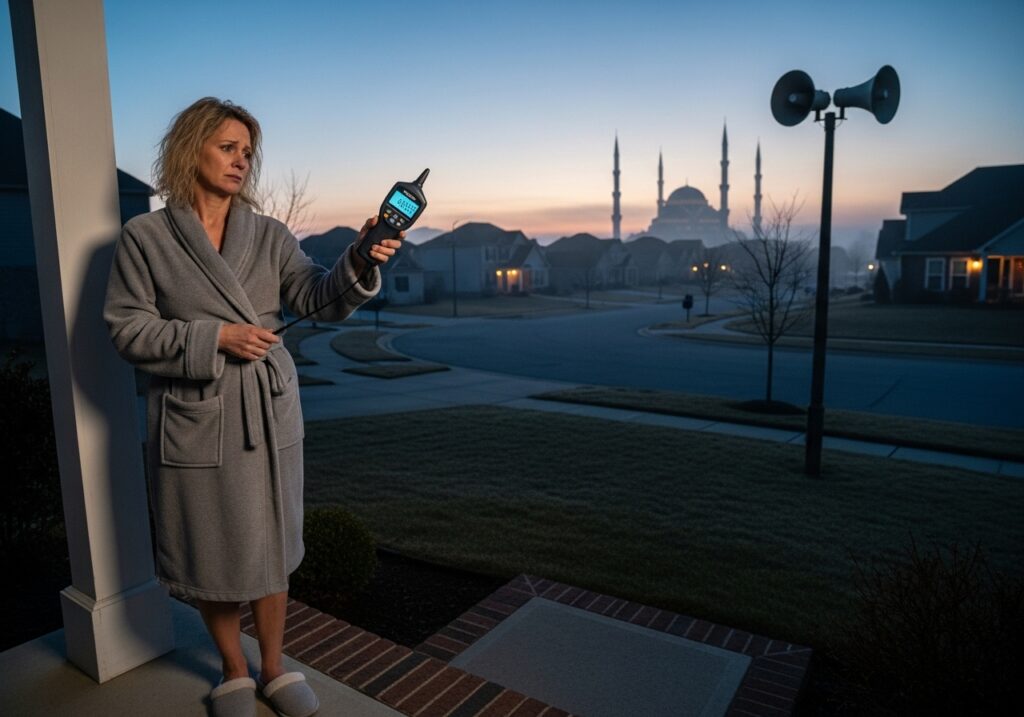If you’ve been on social media lately, you may have seen a headline that sparked a lot of heated debate: “Dearborn Residents Petition City Over Mosque Noise.” At first glance, some would have you believe this is just another case of so-called “Islamophobia.” But when you look closer, the story is far less about religion and far more about fairness, community standards, and enforcing the law equally for everyone.
Let’s get to the facts.
In Dearborn, Michigan—a city with one of the largest Arab-American populations in the country—longtime resident Andrea Unger has had enough. For two years, she’s been raising concerns about the daily call to prayer broadcast over loudspeakers from a mosque near her home. The sound, she says, starts as early as 5:30 a.m. and can be clearly heard inside her house, despite being a quarter-mile away.
This isn’t about someone being bothered once or twice. Unger documented the noise for 30 straight days. She found that the sound regularly exceeded 70 decibels—well above what the city allows. According to Dearborn’s own noise ordinance, anything over 60 decibels during the day and 55 decibels at night is considered a violation in residential areas.
And Unger isn’t alone. She brought a petition to the city council, signed by 40 of her neighbors, asking for the law to be enforced. That’s not a small number. These are everyday citizens—parents, workers, retirees—who expect the same peace and quiet in their homes that anyone else would.
But here’s where things get frustrating.
Despite the clear evidence of a noise violation, the city has done little to address the issue. Police have investigated and confirmed that the mosque’s speakers are in violation of the ordinance. Yet, enforcement has stalled. Residents are still waiting for action.
Why the delay? That’s where things take a concerning turn.
Dearborn’s Mayor, Abdullah Hammoud, has been quick to defend the mosque. In fact, when a Christian minister voiced similar concerns, Hammoud lashed out, calling him a “racist,” a “bigot,” and an “Islamophobe.” That kind of attack shuts down honest discussion. It sends a message: If you speak up about certain issues, you’ll be labeled and shamed into silence.
And that’s exactly what some residents fear. Several neighbors told Unger they were afraid to speak out publicly. They didn’t want to be accused of hating Muslims. That’s a chilling effect on free speech and local democracy. When people are too scared to ask their government to enforce its own laws, something is broken.
It’s important to note that this isn’t a fight against religion. Unger herself has stressed that her complaint has nothing to do with faith. She’s not asking for the call to prayer to be banned. She’s asking for the volume to be turned down—just like any other noise that disturbs the peace.
And it’s not like compromise is impossible. Another mosque in Dearborn, the Dearborn Community Center, voluntarily lowered its speaker volume after hearing from nearby residents. That’s how a community should work—mutual respect, open communication, and shared responsibility.
But when one group is allowed to ignore the rules, and anyone who objects is smeared with ugly labels, that’s not fairness. That’s favoritism.
The real question is this: Do noise ordinances apply to everyone, or just to some? If a neighbor blasted music over a loudspeaker at 5:30 in the morning, you can bet the city would shut it down fast. So why the double standard?
Dearborn’s residents deserve answers. They deserve peace in their homes. And above all, they deserve equal treatment under the law.
It’s time for city officials to stop hiding behind politics and do their jobs. Enforce the ordinance. Respect the residents. And remember: fairness isn’t anti-anything. It’s what holds a community together.

